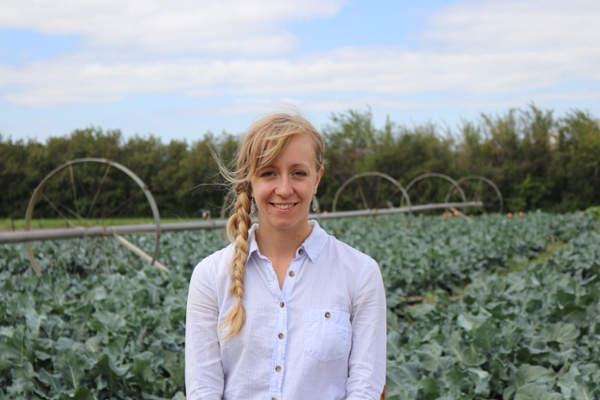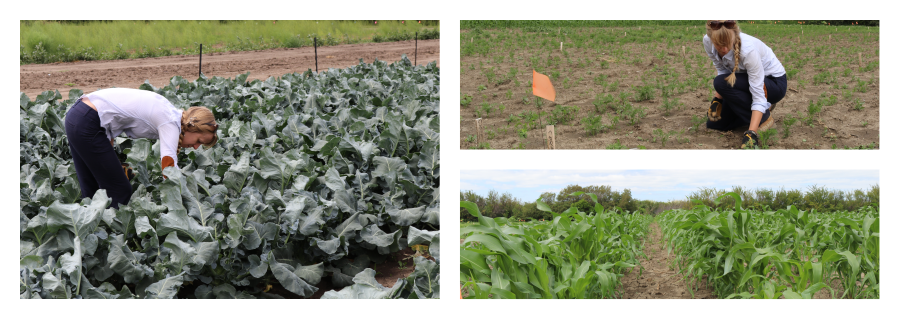
Researching WISE Growing Practices at the U of S
Taryn Goff received an ICAN-WISE scholarship in the summer 2017, allowing her to work with Dr. Kate Congreves in the College of Agriculture.
After receiving her bachelor degree in English, Taryn Goff returned to the U of S in 2016 to begin her second undergraduate degree in Plant Science. Securing an ICAN-WISE (Integrated Collaborative Academic Network for Women in Science and Engineering) Scholarship in addition to matching university funding for Undergraduate Student Research allowed her to spend her first summer back on campus working under the supervision of Dr. Kate Congreves in the College of Agriculture on a multi-year research project.
Taking to the Field
While the change from Humanities to Agriculture may seem dramatic, Goff says it was a natural decision for her. “I've always had an interest in plants, and in gardening, and in food. I never really thought of [the] specific plant and horticulture side as a career option, [but] I actually ended up over the years meeting a lot of really interesting people – particularly really interesting women – who have jobs in horticulture-related fields and who did this degree, and so… I'd love to do something like that myself.”
Goff says that securing a position on Congreve’s project was a way to confirm that her shift in focus was warranted. “Being part of [this] was a way to get a lot deeper into my interests… I'm pretty unfamiliar with the sciences, and I saw an opportunity to… right off the bat, get a better idea of how research works and what comes out of it.”
According to Goff, this project brings some interdisciplinary aspects to Congreve’s field of soil science in hopes of discovering a more environmentally-friendly way of growing vegetable crops. The team is working with a multi-year, multi-crop rotation of carrots, sweet corn, and broccoli, to which they are applying different rates of nitrogen and phosphorus fertilizer. Then, plant growth is monitored to determine which rate is the most effective in increasing plant yield while producing the lowest amount of pollution, such as the greenhouse gas nitrous oxide. As a summer student, Goff’s role in the project is hands-on and essential to its success. “[I’m] helping make sure that the crops are grown the way they're supposed to be, and also collecting data like soil samples and notes, which then her [Dr. Congreve’s] graduate students in the future will be able to use,” Goff explains.
Re-Imagining Plant Health
Working with new concepts and processes based in soil science, Goff has synthesized new ideas with her pre-existing knowledge of plant health. “Being involved in this has made me think more about soil. I've always been really plant-based, or just only thinking about the plants themselves, and this has really opened my eyes to how important it is to feed and care for your soil, and how much plant health is related to that,” she says.
Developing a holistic view of plant science is important to Goff, who is able to view the societal implications of her research from a humanities standpoint. “I'd like to think that in the long run maybe I'd be able to think not just about the nuts and bolts of how plant growth works, but about what that means for us as a society, how we choose to grow food, how we choose to distribute it, [and] to direct the research in such a way that seems to be for the good of people,” she explains.
In the meantime, Goff says she is satisfied with the work she is doing with Congreves. “I really [like] feeling responsible for what's going on and feeling engaged and involved in a meaningful way. I think it's really important to see the work that you're doing as being productive, and this particular type of research is especially good for that because when you plant seeds and you watch them come up, you feel like you've actually accomplished something… So I really like the hands-on aspect of this,” she says.
Celebrating Women in Science
Not only was Goff selected by the university as a top candidate for a funded research assistantship, but she also received one of two ICAN-WISE Scholarships awarded in Saskatchewan in the past year. This prize is reserved for exceptional female undergraduate students working under female supervisors in the sciences and engineering. The scholarship encourages young women to enter traditionally male-dominated fields and fosters mentorship between students and esteemed female faculty. “I feel really privileged to be a part of that network now and to see how women are working to support each other,” Goff says.
‘Slow Food’ Movement Picks up Speed
Another aim of the award is to recognize the contributions each recipient has made throughout community involvement. Goff took this opportunity to discuss her work in attempting to pioneer a “Slow Food” chapter here at the U of S, and how the movement draws upon the concepts involved in her research. Slow Food originally began in Italy as a counter-movement to the rise of fast food culture, and acts to preserve traditional ways that food is sourced, prepared, and enjoyed.
“Slow Food looks a little different in North America … here, it's really about honouring what all the different settler groups bring, what the original Indigenous people had as really the ultimate Slow Food culture in terms of eating based on place and season, [and] trying to integrate those things [with] the wisdom of newcomers to Canada,” Goff explains.
The campus Slow Food chapter will focus on the philosophy that food should be healthy, sustainable, and good for both the environment and community. “There's different ideas about giving away locally-grown food or having ‘community-eating sessions’ where we talk about how important it is to eat with people instead of on your own . . . that's one interest that some of the international students on campus have talked about [in our group, because elsewhere, everyone has the same schedule and everyone sits down and eats together, [so] they feel really isolated when they have to go sit somewhere and eat alone,” Goff says.
In Perpetual Bloom
Though she has high hopes for the Slow Food group come the 2017-18 school year, for the moment, she is still focussed on growing as much as possible from her research experience. “I'm finding it really interesting and rewarding . . . it's allowing me to feel more comfortable in the sciences; it helps me feel like I belong and that there's a role [for me]. It can be hard to break in [to research] and I can see it's really interesting to get involved as an undergraduate student because then it's not so daunting to think about applying for grad school. It seems more realistic now,” she says.
Goff has already realized two crucial things throughout the course of her experience: first, to pursue your goals despite any fear or uncertainty that may try to convince you otherwise, and secondly: “If you don't get the opportunity you're looking for the first time, to persevere, to maybe look a little broader… you might think one specific thing is really what you want to do, but you might find that there's an opportunity you didn't imagine that's also really going to speak to you, so just keep your eyes open.”
Keeping an open mind to new interests and opportunities has given Goff the chance to explore a new side of herself and to pursue another set of talents. “It's been really good to learn that it's not too late, later in life, a few years after your first degree, to decide that you want to do something else, learn something different, and explore a different side of your brain. I think that's really cool.”
Taryn Goff, BA is completing her second year of Plant Sciences at the University of Saskatchewan.


